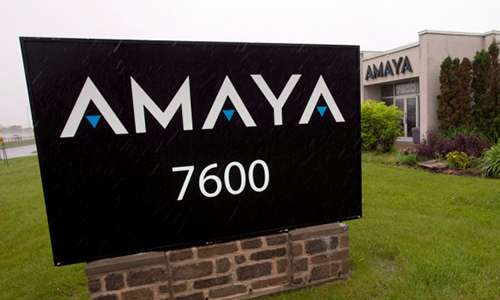Kentucky Judge Orders Trebled Damages, Amaya Announces Appeal Plans
FlushDraw returns from a brief holiday hiatus with a continuation of developments from the US Commonwealth of Kentucky, where on Wednesday, Franklin County Circuit Court Judge Thomas W. Wingate confirmed the most cynical of expectations by approving the state’s request for trebled damages in a long-running case against PokerStars. The total damages thus tentatively owed to Kentucky jump from $290 million to more than $870 million.
 Both the current and former owners of PokerStars are expected to face significant liability from the summary judgment, though current Stars owner Amaya Gaming issued a statement on Christmas Eve announcing the company’s plans to appeal, while also decrying the “frivolous” nature of the home-court judgment in Kentucky’s favor.
Both the current and former owners of PokerStars are expected to face significant liability from the summary judgment, though current Stars owner Amaya Gaming issued a statement on Christmas Eve announcing the company’s plans to appeal, while also decrying the “frivolous” nature of the home-court judgment in Kentucky’s favor.
Amaya’s statement, in its entirety:
Amaya Inc. (NASDAQ:AYA; TSX: AYA) today announced it will appeal a judgment issued yesterday by a state judge in the Commonwealth of Kentucky and will avail itself of any and all remedies available to it.
The litigation was filed by the Commonwealth of Kentucky in 2010 and sought recovery of alleged losses by Kentucky residents who played real-money poker on PokerStars’ website during a period between 2006 and 2011. In the decision, the judge imposed an approximately US$290 million award, which he trebled to approximately US$870 million excluding interest and applicable costs, in favor of the Commonwealth. The latest ruling is in stark contrast to the same trial court’s decision just last month when it determined that damages should be based on the net losses of players. Yesterday’s order applies a methodology that is not grounded in applicable law as it calculates damages based on gross losses of players without any reduction for winnings, bonuses or free play.
“This is a frivolous and egregious misuse of an antiquated state statute to enrich the contingent-fee plaintiff’s attorneys hired by the Commonwealth and not the people of Kentucky,” said Marlon Goldstein, Executive Vice President, Corporate Development and General Counsel of Amaya. “Given that PokerStars only generated gross revenues of approximately US$18 million from Kentucky customers during the five years at issue, a damages award in excess of US$800 million is notable only for its absurdity.”
To bring the action, Kentucky relied on a centuries old statute that was intended to allow individuals who incurred gaming losses to sue their opponents; it was never intended to authorize the Commonwealth to sue and collect such losses for its own benefit. In fact, no other state in the union has brought an action under this type of antiquated statute to recover alleged gaming losses in the name of a state.
Amaya intends to post a bond to stay the enforcement of the order and to appeal in early January. The appeal will, among other arguments, raise factual and legal errors (including violations of the state and federal constitutions) that include, but are not limited to, the trial court’s ruling permitting the Commonwealth to assert standing, its failure to find facts that give rise to the violation of the statute, its clearly erroneous decisions of law, and its failure to properly apply the law to the facts. Amaya will also vigorously challenge the trial court’s calculation of alleged gaming losses, which was based on an improper reading of a 100-year-old leading appellate decision.
Regardless of the dollar amount, to the extent the PokerStars entities may be ultimately obligated to pay any amounts following exhaustion of all appeals and other legal remedies, Amaya intends to seek recovery against the former owners of the PokerStars business.
Amaya has been a leader in promoting the regulation of online gaming in the United States. Earlier this year, following an extensive review, Amaya received approval to begin operating its PokerStars brand in the regulated market of New Jersey, which it plans to launch in the first half of 2016. PokerStars is the world’s most licensed and heavily regulated online gaming brand.
Numerous likely causes for appeal exist, and there is indeed the significant likelihood that the summary judgment will be overturned, greatly reduced in value, or subject to a settlement between the parties to make the whole matter go away. (Early in the week, FlushDraw will take a look inside several of these issues, also referencing the opinions of several legal experts who have already sounded off on the matter.)
Wingate, who is also the issuer of the eventually-nullified ruling that temporarily authorized Kentucky to attempt to seize 141 online-gambling domains back in 2008, has a long track record of highly questionable decisions and rulings favoring Kentucky on the topic. As such, his approval of the trebled-damages request was utterly unsurprising.
Wingate’s ruling included statements such as this: “Without a doubt, the Defendants made a business calculation that took into account the violation of Kentucky’s laws. However, the law is more than some ordinary itemized expense on a balance sheet, and its value is not as easily accounted for as the Defendants may have thought as they executed their illicit business plan.”
Wingate also advised PokerStars not to delay in making prompt restitution, with 12% interest per year in penalties looming. As the appeal announcement showed, the chances of PokerStars heeding Wingate’s words and shipping off hundreds of millions to the state have always been approximately nil. As Sheryl Snyder, one of Amaya’s attorneys, noted, “Absolutely, we plan to appeal. We think that awarding $870 million against a company that did $18 million in revenue is a total misuse of an anachronistic statute.”




















We need to let Darwinism work with these people that are stupid enough to gamble more than they can afford to lose, we have to stop protecting all the idiots of society.